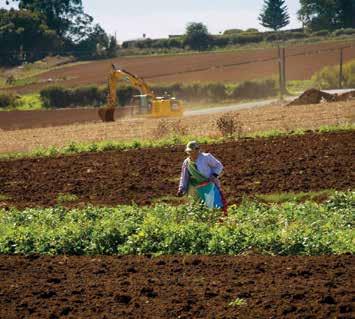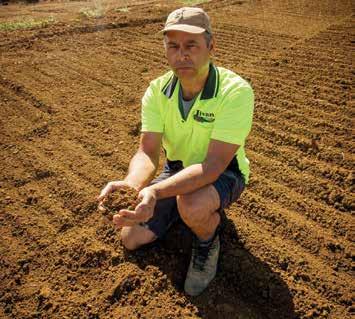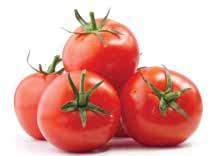
6 minute read
Pukekohe’s unique growing conditions worth fighting for
Words by Andrew Bristol. Photographs by Trefor Ward
Bharat’s mother in the field
Bharat Jivan, whose family has been growing vegetables in Pukekohe for 70 years, says Pukekohe’s unique growing conditions are worth fighting for and retaining.
“This is premium growing land that needs to be retained for vegetable production, but some people think we should build houses on it. Auckland’s so lucky that vegetables are grown so close to it, however, that did not happen by chance. This land was identified as fertile soil. If you go south of Pukekawa, the soil changes. Yes, potatoes are grown down there but you don’t get the premium price for them that you get for Pukekohe-grown potatoes. They also need washing because retailers don’t want a dusty product. Washing’s fine but it reduces shelf life and makes the potatoes more prone to greening.” Bharat says they can plant potatoes as early as 1 June because the soil is frost-free.
“Pukekohe is renowned for these potatoes. Also, when Ohakune runs out of washed potatoes and carrots in about October, this region takes over and fills the gap. “It’s all down to soil type and latitude. You can’t just grow vegetables anywhere. “We’ve also got customers in Europe who only want onions out of the Pukekohe region because of their long-keeping qualities. That’s thanks to where and how they are grown.” Bharat – who is 50 – says he’s only a caretaker of the land. He came onto the family farm 20 years ago and considers himself lucky because his son – who has just finished university – is happy to carry on working on the farm. Bharat suspects that his brother Pravin’s son will do the same. Jivan Produce grows onions – 70% for export with the rest for New Zealand – potatoes, lettuce all year round for fresh consumption and processing, and pumpkin and broccoli through the winter. Bharat says “it’s getting really hard to make a dollar.” “We used to crop 80 acres and make a comfortable living off it. Now you have got to have scale and with that, you have to have staff.
“We employ 12 or 13 people full-time, plus casuals and contractors for seasonal work. That’s been really challenging this season but we’re getting by. “More and more people want full-time work. That’s one of the reasons why we now grow broccoli in the winter. It keeps the staff going and it’s good for the ground.” Bharat says that when he joined the business, he worked out that they needed to be caring for the soil a bit more. “I started applying compost back then and now we do that on an annual basis. We also grow mustard, oats and barley

Bharat says it all comes back to the soil
on rotation. We don’t make a lot of money out of the barley but it leaves a lot of straw matter behind. We incorporate this into the ground and it makes the soil more friable. The straw’s like a lot of little snorkels. It lets the ground breathe and prevents it getting compacted, and you see the benefits in your next vegetable crops.” Bharat says it all comes back to the soil.
“We’ve been growing here for 70 years and are still producing really good crops. That’s through sound management, also because these soils are volcanic, really resilient and free draining. “We purchased more land about a year ago but are not really growing any more crops or acreage. It’s just so we can rest the ground more, but this is a hard thing to do as land around here is so expensive – $50,000 an acre or $125,000 a hectare. “And yet, right on our boundary, they are building a school and around that, more housing. It’s not the best site for a school, which we pointed out – even the local community board was against it – but it was too late.” Bharat says that some local growers “have gone up north looking for early ground.” “People also say we could move south of the Waikato River. But this is our home. We’re not a corporate that can just up and move. This is where our family is based. “Plus, all of horticulture’s loyal support industries are right on our doorstep in Pukekohe. And then we’d have to get resource consents, which is not easy or cheap.” Bharat says “climate change is happening and it is a concern.” “We have a couple of properties that don’t have water and we are limited by what we can grow on them. “Once that Watercare consent goes through, there’s not going to be much scope for expanding vegetable production, due to the most limited availability of water. “That said, there’s probably enough water here. We just all have to be smarter about it and all work together. For example, water harvesting in the winter; but it is just too difficult to build a dam with all the compliance and consents. It’s even difficult for Watercare.
“It’s also very costly and when you are selling potatoes for $4.00 to $5.00 a bag, you just can’t justify the investment.” Bharat says water quality is good here, despite what people might read or hear about it. “We test every year and have never picked up anything. We also test for residues every three months, but have never had an issue. That’s because we do everything to internationally-recognised programmes, which are robust and independently audited. “We rigorously adhere to these programmes, which costs us money. But then produce gets imported that has no quality assurance programmes behind it. I find that a little unfair. Also, what assurance do customers have about the quality or integrity of imported produce? “My kids won’t eat anything from overseas and more and more people want to know where their food comes from. And it’s not good enough to just say it’s imported.” Bharat says New Zealand vegetables are grown to high standards by caring and passionate growers. “But I do not know if that is appreciated enough. As I’ve said, Auckland is so lucky that we’re right here and can have fresh vegetables picked that day delivered 365 days of the year.”
Bharat shared these insights with representatives of Auckland Council, the Ministry for Primary Industries, Ministry of Foreign Affairs and Trade, and Ministry for Social Development as a part of an Onions New Zealand government officials bus tour in mid-February 2021.
Heat Pump Food Dehydrators
For drying food in an easy and quick way, the economical solution to producing value added products, whether you’re looking to grow your product range or give a new business the kickstart it needs.
Nuts, Berries, Fruits, Vegetables, dry to Slices, Pieces and Powders, - with the end result being succulent, healthy, and tasty dried products every time. Unique Features: Because no hot vapour is lost during the drying process, no energy is wasted, achieving 100% energy recycled. Therefore highly efficient with low energy consumption. • WRH-100 Cabinet series can dry up to 100kg of fresh product • WRH-300 Cabinet series can dry up to 350kg of fresh product • AIO-500/600 Chamber series can dry up to 1500kg of fresh product
Contact us for free testing for your product, or more information: Netropolitan Ltd: 3 St. Georges Bay Rd, Parnell, Auckland Ph: 09 368 4416, Mob: 021 358 380 Email: sales@netropolitan.co.nz, www.netropolitan.co.nz/brand/ike/










